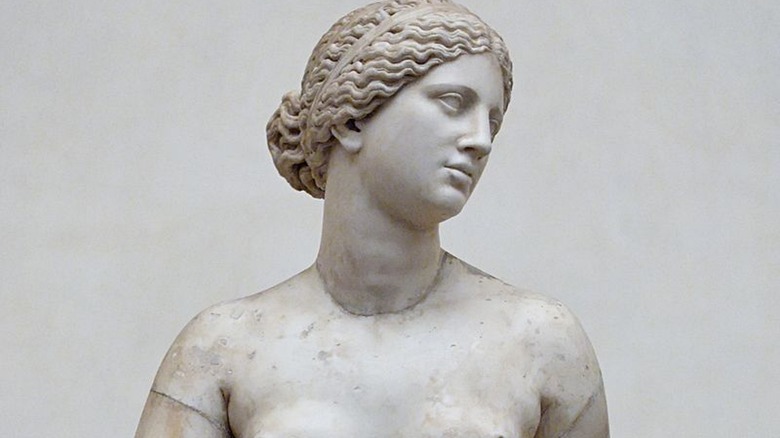The Risque Defense An Ancient Greek Courtesan Used To Avoid A Death Sentence
When you think of ancient Greece, you might think of philosophers like Plato and Aristotle, or poets and writers like Homer and Sappho. But, have you ever heard of Phryne? Also known as Mnesarete, Phryne was an ancient Greek courtesan who lived in the 4th century B.C., according to Britannica. A courtesan — dubbed "hetaira" in ancient Greek — was a type of high-end prostitute who served wealthy individuals, according to History of Yesterday.
During her life, Phryne was one of the most famous of the hetaira, in part because of her extreme beauty, according to Ancient Origins. Though her nickname, Phryne, meant "toad" — a name given to her for her yellowish complexion — Phryne was considered one of the most beautiful women in the world, a reputation she nurtured partially by remaining clothed in public. While other courtesans wore skimpier outfits, Phryne kept the details of herself mysterious, even avoiding public baths in order to keep up the air of secrecy. As a result, her beauty became notorious, and several sculptures were modeled from her image, including sculptures made by one of her lovers, Praxiteles.
Phryne's life in Ancient Athens
Ancient Greece, like many civilizations throughout antiquity, was a male-centric society in which women had fewer rights than men. However, courtesans like Phryne had more freedom in ancient Greece than many other women. As a result, more opportunities were available to them, including the opportunity to obtain more education, according to the BBC. Phryne in particular was known for her wit. She was able to make a quick play on words, such as when she called a cheap lover "Eros of Pheidias." Pheidias sounds somewhat similar to another Greek word meaning "thrift," making this retort the ancient Greek equivalent of a savage burn.
Phryne was also known for her wealth and generosity. She allegedly accumulated so much money that she offered to fund the rebuilding of the walls of the Greek city Thebes, after they had been destroyed by Alexander the Great some years earlier, according to Ancient Origins. In exchange for financing the rebuilding, she wanted the walls to be marked with an acknowledgment that she was their patron. But the city, not wanting to turn to a prostitute for help, ultimately turned her down.
Phryne's trial
Despite her place in high society, Phryne found herself in a spot of legal hot water when she was charged with a capital offense, according to Ancient Origins. Though sources differ as to precisely what Phryne was charged with, many claim that she was charged with blasphemy (via Britannica), perhaps for standing as a model for a statue of a goddess (via the BBC), or for profaning the Eleusinian Mysteries (via Greek Reporter).
In any case, Phryne soon found herself at court, where, defended by one of her lovers, Hypereides, it became apparent she was losing her case. In a last-ditch effort to salvage a win, the story goes that Hypereides tore Phryne's clothes off. Displaying her long-hidden body to the room, he demanded of the judges, "How can you condemn beauty?" according to History of Yesterday. With Phryne's supreme beauty used as evidence of the gods' favor for her, the male jury agreed to acquit her, and Phryne was freed.
This story may very well be a myth: Alternate tellings of Phryne's trial say that she tore her clothes off herself and went from juror to juror begging them to free her (via Britannica) while other tales don't mention her getting naked at all (via the BBC). But in the end, fact or fiction, it's certainly clear that Phryne's beauty and wit made her infamous, not just in the minds of her fellow Athenian citizens, but also in the pages of history books.


